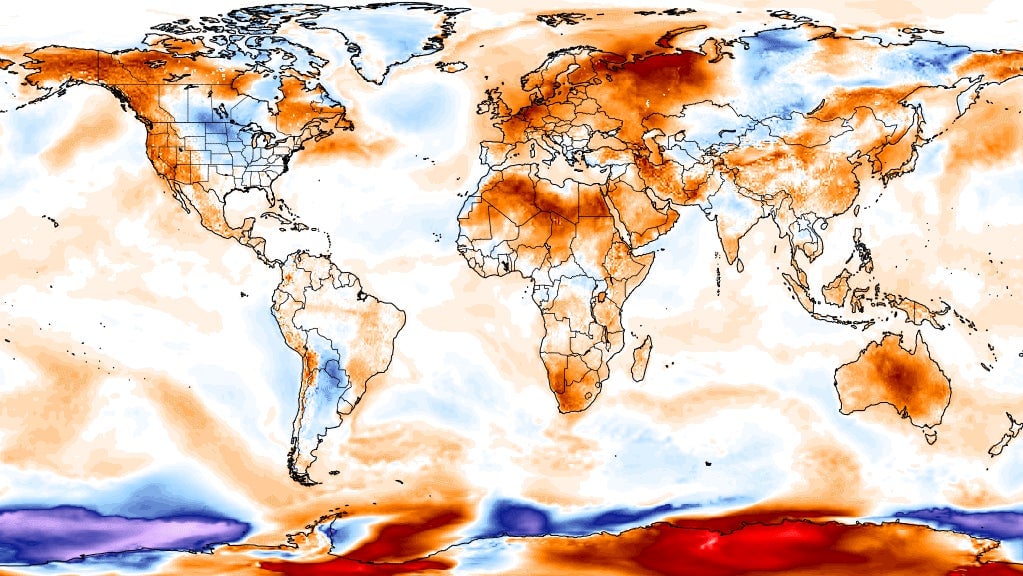All the reasons much of the world is in the grip of a heatwave
In my 10 years living in the UK, I’ve never slept poorly because it was too hot. Then it happened two nights in a row this month, on the hottest days of the current British heatwave.


In my 10 years living in the UK, I’ve never slept poorly because it was too hot. Then it happened two nights in a row this month, on the hottest days of the current British heatwave.
In many countries, soaring temperatures have meant more than sleepless nights. Heatwaves have killed 50 in Canada and 80 in Japan, caused droughts in Germany and Scandinavia, set record temperatures in Algeria, Morocco, and Oman, and left the UK looking brown from space. The heat has spurred wildfires that have claimed at least 80 lives in Greece, melted electrical wires in California, and forced Sweden to call for international help.
No scientist will jump to the conclusion that an extreme weather event is the direct result of climate change. Weather is a localized phenomenon to which long-term climate trends contribute. The more greenhouse gases we put into the atmosphere, the warmer the climate gets and the more likely these extreme weather events become.
The rise in global average temperature caused by climate change is the common denominator of these extreme weather events. Each region, however, has other factors contributing to its suffering:
South Asia (May)
In April and May, some of the world’s most densely populated countries—India, Pakistan, and Bangladesh—were gripped by a heatwave. The death toll in the hundreds was bad, but South Asia has seen worse in the last few years. As a tropical country, the primary driver of heatwaves in India is climate change, and it could get pretty bad in the future. A former Indian minister thinks that the heat and humidity is likely to make many cities “unlivable.”
A 2018 study has found some mitigating factors. India’s use of coal puts aerosols in the air that reflect some of the heat into the atmosphere. In the short-term then, as India moves to cleaning up air pollution, it is likely to see a negative effect through rising heat (even though cleaner air would have other health benefits).
Europe (June and July)
Europe’s summer has a lot to do with what the jet stream does. That band of fast-moving winds a few miles above the Earth blowing west to east helps create pressure differentials and drive the change in weather. This year, the jet stream has slowed down.
“Ocean temperatures have been relatively warm between the Gulf of Mexico and North Africa while temperatures south of Greenland have been unusually cold. This is thought to have pushed the jet stream further northwards, sending bad weather towards Iceland while allowing areas of high pressure to linger over Europe,” writes Len Shaffery, professor of climate science at the University of Reading.
Siberia (June)
The factors that caused the heatwave in Europe are also responsible for the wildfires in Siberia. There is, however, an additional factor: melting Arctic ice. As more of the white ice melts away because of climate change, the more sunlight is absorbed by the darker ocean. That creates a feedback loop, causing temperatures to go up further and thus melt more ice.
Melting of Siberia’s permafrost (so-called because it is supposed to remain permanently frozen), could release vast amounts of carbon and methane that otherwise would have stayed in place. Those greenhouse gasses would further contribute to global warming, and add to the feedback loop.
Japan (July)
The high-pressure dome sitting atop Japan is blocking cold winds from coming in, according to CNN meteorologist Michael Guy. And for a rich country, the number of heatwave deaths—likely in the hundreds despite the official toll—is unusual. One reason may be the lack of air-conditioning. “Cultural sensitivity over wastefulness has harbored a general apathy towards air conditioning over the years,” according to CNN.
California (July)
California’s weather in the summer is hot, dry, and windy. The combination can and does cause wildfires. Human presence has made made it worse. Portable barbecues, unextinguished cigarettes, or broken power lines can provide the spark needed to start fires that would otherwise not have happened.
Climate change adds to the woes of increased temperatures. This year, for instance, wildfires arrived earlier than usual, partly because of that.